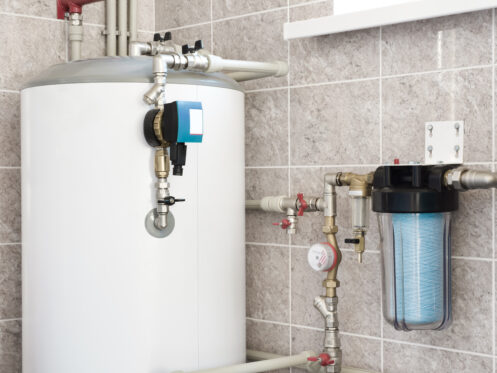The popularity of tankless water heaters has grown rapidly in the past decade or two. Tankless water heaters do cost a bit more upfront compared to traditional tank-type units. Still, they provide many advantages that can make the higher initial cost more than worth it. One of the most significant advantages is that tankless water heaters are more efficient, and this article will explain why this is and how tankless units work.
How a Tankless Water Heater Works
Tankless water heaters are commonly called on-demand water heaters since they never run except when hot water is needed. This is one of the main reasons they are more efficient than tank water heaters. A traditional water heater wastes energy by keeping the large tank of water constantly hot. If you were away from home for 24 hours, a tank water heater normally runs for at least two to three hours.
Gas and electric tankless water heaters work using a heat exchanger that instantly transfers large amounts of heat to the water as it flows through the unit. While it takes a short time for the heat exchanger to fully heat up, the water flowing out of the unit will usually be heated to the desired temperature in under 30 seconds.
In a gas unit, the heat exchanger is essentially just the exhaust flue through which the hot combustion fumes rise. When the unit runs, water flows through a pipe that is coiled around the flue and naturally absorbs the heat. Electric units have electric heating elements that surround the pipes and transfer heat to the water flowing through them.
Comparing the Efficiency of Tankless and Tank Water Heaters
While tankless water heaters are generally more efficient than tank water heaters, the amount you can save on energy costs with a tankless unit depends largely on your typical hot water usage. Households that use under 40 gallons of hot water a day on average will see the biggest savings. In this case, the US Department of Energy (DoE) estimates that a tankless water heater typically uses anywhere from 24% to 34% less energy. If your household’s average daily hot water usage is more than 86 gallons, the DOE estimates a tankless unit would still use between 8% and 14% less energy than a tank unit.
Factors That Can Impact Tankless Water Heater Energy Savings
Whether you have a single whole-house tankless water heater or multiple point-of-use units at each fixture can also make a significant difference in your overall energy savings. A whole-house unit will use at least a bit more energy due to the increased lag time, which is how long it takes from when you turn a fixture on until hot water begins flowing. If you have a larger home with some hot water fixtures that are much further from the water heater, the lag time can potentially be anywhere from 30 seconds to a minute or more. You’ll also experience longer lag times during the winter. This is because the water flowing into your house is colder. Your pipes are also colder in the winter, which means the water will only get to the desired temperature at the fixture once enough hot water has passed through the plumbing to warm up the pipes.
Having a point-of-use tankless unit for each bathroom and anywhere else that you need hot water will cost you more upfront. Nonetheless, this type of setup will help you save more energy. Since point-of-use units are located near each fixture, they also have a much shorter lag time, which further reduces their energy usage.
How much money you can potentially save with a tankless water heater also depends on the fuel source of both the new tankless unit and your existing unit. Gas water heaters typically cost less to operate since natural gas rates are usually lower than electricity rates.
If you need to replace your existing water heater, Midstate Plumbing & Air is ready to help. We install all types of water heaters and provide a 10-year warranty on all units. Contact us today to schedule a consultation and learn about your water heater options or to schedule any other plumbing service in Bridgeport, WV.
